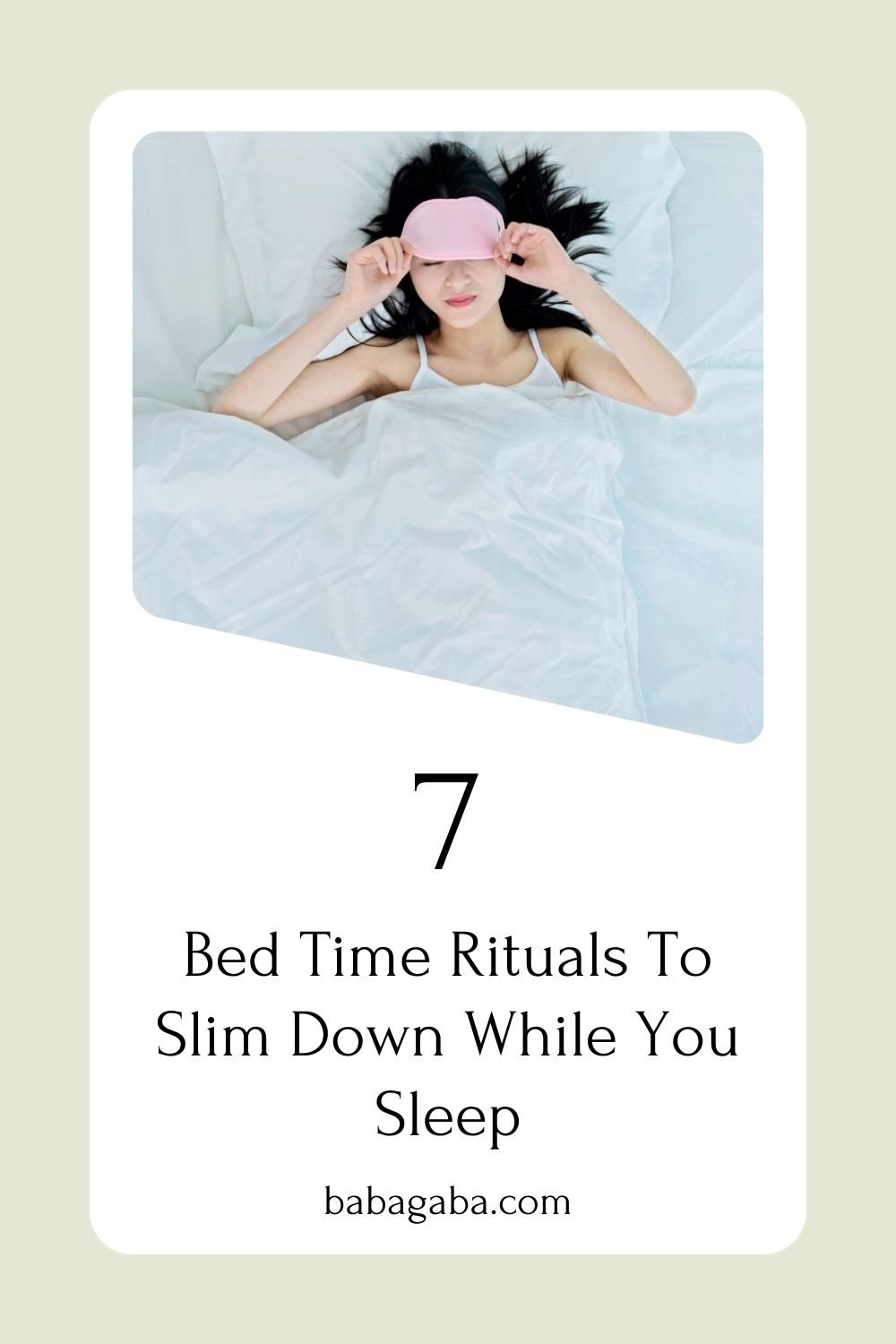
When it comes to weight loss, you probably think about the things you do during the day that move you toward your goal. You eat a healthy breakfast in the morning, exercise after work, and try to eat sensible portions.
But weight loss isn’t just a matter of diet and exercise – it’s also about sleep. The amount and quality of sleep you get each night have a significant impact on your ability to lose weight.
You already know that it’s important to maintain healthy habits if you want to lose weight. If you’re not applying that principle to your nightly routine, however, you could be hampering your progress. It’s just as important to have a healthy ritual at night as it is during the day. If you don’t already have a bedtime routine in place, starting one just might be the change that makes the scale start moving again.
In this book, you’ll learn about the link between sleep and weight loss. You’ll learn how much sleep you should be getting each night and why it’s more difficult to lose weight (and easier to gain it) when you’re not sleeping properly.
Most importantly, you’ll receive a list of seven bedtime rituals you can incorporate into your nightly routine to start sleeping better and losing more weight.
The Importance of Sleep for Weight Loss
Nothing is better than collapsing into your bed at the end of a long day. A good night’s sleep gives your body (and your brain) a chance to rest and recharge. What you may not realize is that while you may not be moving, your body is still very active during sleep.
During sleep, your brain processes and stores new information. Your cells regenerate, repairing muscle, synthesizing protein, and growing tissue. Energy levels are restored and essential molecules like hormones are released. The fact is sleep is essential for survival and the amount of sleep you get affects everything from daytime energy levels to your ability to lose weight.
The connection between sleep and weight is stronger than you may know.
It’s no coincidence that obesity rates in the United States are at an all-time high while the Centers for Disease Control and Prevention (CDC) estimates that 35% of American adults get fewer than 7 hours of sleep per night. But how does sleep impact weight?
1| Getting proper sleep may help you avoid weight gain
In an analysis of 20 research studies that included over 300,000 people, individuals who slept fewer than 7 hours per night were found to have a 41% higher risk of obesity. Sleep was not found to be a factor in the development of obesity for individuals who regularly got 7 to 9 hours of sleep per night.
Sleep is just one factor in the development of obesity but it can be impactful in several ways. When you don’t get adequate sleep, levels of key hormones can become unbalanced. Insulin-like growth factor 1 (IGF- 1), for example, is one of the hormones linked to fat storage. When IGF-1 levels are unbalanced, your body might store fat more easily which can contribute to weight gain.
2| Adequate rest may help moderate your appetite
When you’re sleep deprived, your appetite tends to increase. Some studies have found that individuals who are sleep deprived ate over 350 additional calories per day. In many cases, the majority of those extra calories came from fat.
This effect is again linked to changes in hormone balance. Ghrelin, the hormone that controls hunger, may become more abundant while the hormone that makes you feel full, leptin, may decrease. This can cause you to consume more calories than you need – particularly from high-fat and high-sugar foods.
3| Being well-rested helps you make healthier food choices
It’s difficult to make careful decisions when you’re tired and that applies to every aspect of your life, including your diet. When you’re sleep deprived, it sometimes feels like too much effort to prepare a healthy meal, so you order takeout instead. It’s harder to resist temptation.
Not only can sleep deprivation lead you to eat more food, but the extra food you consume is more likely to be high in calories. One study found that sleep-deprived individuals experienced greater reward-related responses in their brains when viewing images of high-calorie foods. These participants also tended to spend more on food than people who got adequate sleep.
4| Going to bed early helps prevent late-night snacking
Aside from the physiological impact of poor sleep on things like appetite and decision-making, sleeping for longer physically prevents you from eating more than you should. If you go to bed early, you won’t have an opportunity to snack late at night – your time window for eating gets smaller.
Not only has late-night snacking been associated with higher body mass index (BMI), but it has been correlated with decreased fat oxidation. This means it can make weight loss more difficult to achieve. Eating too close to bedtime can even negatively affect your sleep quality which may make matters worse, leading to sleep deprivation and poor food choices the next day.
5| Getting enough sleep helps you avoid decreases in metabolism
Getting a good night’s sleep helps restore balance in your body, including your metabolism. The term metabolism is sometimes used interchangeably with resting metabolic rate (RMR) – the number of calories you burn when your body is at rest. Your RMR is affected by things like your age, height, weight, sex, and muscle mass.
Some studies have shown significant decreases in RMR in sleep-restricted individuals. These same individuals saw their RMR return to normal after they caught up on missed sleep. More research is needed to determine the link between sleep and metabolism, however. Some studies have actually found that short sleep increases energy expenditure simply because you spend more time awake.
6| Proper sleep may increase your motivation to exercise
When you don’t get enough sleep, you feel the effects the next day – you’re tired, both physically and mentally. Studies have shown that daytime fatigue related to lack of sleep can reduce the motivation to exercise. Combined with potential decreases in RMR and increased appetite, this is a recipe for weight gain.
On top of reducing your motivation to exercise, sleep deprivation can negatively affect your athletic performance when you do exercise. Poor sleep can decrease your reaction time, hamper your fine motor skills, limit endurance, and even reduce your muscular power. It can even increase your risk for injury and delay your recovery.
7 Bedtime Ritual to Maximise Fat Burn
Your sleep requirements may change over the course of your life but experts recommend seven or more hours per night for adults over the age of 18. But spending a minimum of seven hours in bed each night isn’t necessarily good enough. If you spend an hour scrolling through social media and another hour tossing and turning after that, you’ll be lucky to end up with five hours of sleep. It might not even be restful, high-quality sleep.
How you spend your time in the evening leading up to bedtime matters. It affects how quickly you’re able to fall asleep and how restorative your sleep is. It can also impact your weight loss.
The key to healthy, restful, and weight loss-supporting sleep is to cultivate good sleep hygiene. The term sleep hygiene refers to practices or habits that are conducive to good sleep. It means making sure your activities before bed prepare your body for sleep and the environment in your bedroom supports uninterrupted sleep.
Building a bedtime ritual is about consistency more than anything else. The elements you choose to include in your nightly routine are up to you, though some habits will go further than others in supporting sleep and weight loss.
Here are seven bedtime rituals to incorporate into your nightly routine to start getting better, more restful sleep and to harness your body’s natural fat-burning ability:
1| Don’t wait for bedtime to brush your teeth
Even if you don’t follow an extensive nightly routine, you’re probably in the habit of brushing your teeth before bed. If you’re struggling to lose weight, however, you might consider shifting this simple habit a little earlier in the evening. Instead of brushing your teeth right before you get into bed, do it after dinner.
Not only does brushing your teeth after dinner support healthy dental hygiene, but it sends a message to your brain that you’re done eating for the day. It’s a quick and easy thing you can do to curb late-night snacking. In a way, it’s like training your own body to recognize that your evening meal is the last thing you’re going to eat that day.
Aside from the psychology of it, brushing your teeth after dinner leaves a minty, slightly sweet taste in your mouth. This might help curb cravings for sweets. At the very least, you might be better able to resist the temptation to snack before bed if it means having to brush your teeth all over again later.
2| Make sure bedtime snacks are rich in protein
While it’s best to avoid eating late at night, if you eat dinner early you may find yourself needing a snack a few hours later. If you do eat close to bedtime, make sure your snack is rich in protein – yogurt is a perfect choice. A glass of milk or a protein smoothie would work as well.
Eating a protein-rich snack instead of something sugary or high in carbs can help you build lean muscle mass. The higher your lean muscle mass percentage, the faster your resting metabolic heart rate will be – you’ll burn more calories without changing your activity level.
Dairy products like yogurt are the perfect bedtime snack because they contain casein, a slow-digesting protein your body will turn into lean mass overnight. A cup of plain, whole milk yogurt only contains about 150 calories but provides 8.5 grams of protein. If you’re concerned about carbohydrates, some non-fat yogurts and Greek yogurts contain fewer carbs per serving. They also tend to be even higher in protein.
If you’re lactose intolerant or vegan, yogurt might not work for you. Try mixing up a plant-based protein shake or enjoy a tablespoon or two of nut butter with celery sticks. A handful of almost or roasted chickpeas provides a decent amount of protein as well without too many calories.
3| Light a candle as you ready for bed
When it starts getting close to bedtime, it’s time to set the stage for sleep. One of the simplest things you can do to promote relaxation is to light a candle. Whether you’re hanging out on the couch or reading a book in bed, the soft glow of a candle creates a calming ambiance. Depending on which scent you choose, you might enjoy some other benefits as well.
Though aromatherapy is typically utilized for relaxation, research suggests that certain scents can help support weight loss. Think about your favorite foods and how a single sniff of that tasty dish is enough to make your mouth water. In the same way certain smells can stimulate your appetite, some fragrances can suppress it. If you struggle to avoid late-night snacking, lighting a candle with a particular scent might help curb your cravings.
Some of the best appetite-suppressing scents are peppermint, green apple, vanilla, and banana. If you don’t like the idea of leaving a candle burning while you sleep, light it at the start of your wind-down routine and give yourself a good thirty minutes of aromatherapy before you hit the hay. Another option is to buy an essential oil diffuser to disperse scent in your bedroom overnight.
4| Sip a mug of hot tea to start winding down
When you think about stereotypical relaxation advice, sipping hot tea is definitely on the list. Why? Because it works. It’s important to choose the right tea, however.
Green tea and black tea are packed with antioxidants and natural compounds that can boost your metabolism and help you lose weight. Unfortunately, these teas also tend to be high in caffeine and may make it more difficult for you to fall asleep. If you’re going to include tea in your nighttime routine, go for herbal tea or decaffeinated green tea.
A hot mug of tea is infinitely better for supporting healthy sleep than boozy beverages.
A glass of wine or a cocktail might make you drowsy but drinking alcohol before bed can negatively impact your quality of sleep – especially during the second part of the night. Because your body is working on metabolizing the sugar from the alcohol, you won’t sleep as deeply. Alcoholic beverages are also likely to be higher in calories than a mug of tea, so tea is the better all-around choice when it comes to weight loss.
5| Make your room as dark as possible
Some people have the ability to sleep anywhere at any time. Though you might be able to fall asleep with the lights on, you may not sleep as well as you do when they’re off. Studies suggest that even dim light can negatively affect your sleep quality – it may even hamper your weight loss efforts.
The best way to make your room dark for sleep is to use blackout curtains. Curtains made from dark fabric will help block outside light but their benefit may be limited if the fabric isn’t thick enough. Blackout curtains are designed specifically to block light. You could also try wearing a sleep mask to block out light.
If you want to take things a step further, avoid bright light at night. Exposure to bright light in the evening can hamper your body’s production of melatonin, the hormone that helps regulate your sleep-wake cycle. If the lights in your home aren’t on a dimmer, try switching to smart bulbs that enable you to control the brightness using an app.
6| Keep your bedroom cool and comfortable
Darkness is essential for quality sleep but the temperature in your bedroom makes a difference as well. Research suggests the ideal temperature for sleep is around 65 degrees Fahrenheit. If you tend to sleep hot, however, you might want to turn the thermostat down a few more degrees or try running a fan at night.
Not only can keeping your bedroom cooler at night help you sleep better, but it may support your weight loss efforts as well. There are two types of fat in your body – white fat and brown fat. White fat is the type that stores calories while brown fat burns calories. Brown fat plays a role in regulating your body temperature. If you make your environment colder, your body will have to burn more brown fat to regulate your internal temperature.
7| Disconnect from electronics for at least 30 minutes
If you utilize none of the other tips on this list, pay attention to this one. Reducing your screen time – especially at night – is one of the most effective things you can do to improve your sleep quality. You may feel like scrolling through social media or watching a YouTube video is a good way to wind down in the evening but it might be having the opposite effect.
The problem with using electronic devices before bed is that they produce blue light. Blue light reduces melatonin production, so all that screen time might actually make it more difficult for you to fall asleep. It’s best to avoid electronics for at least 30 minutes before bed but if you can swap out screen time for another activity like reading for an hour or more, all the better.
BONUS: Do Yoga Before Bed.
BONUS: DO YOGA BEFORE BED.
Some research shows that vigorous exercise right before bed can hamper your ability to get to sleep but something relaxing like yoga could actually help. Yoga involves slow, purposeful movements and stretches combined with deep breathing. Deep breathing exercises activate your parasympathetic nervous system which can help you relax and fall asleep faster.
In addition to helping you fall asleep faster, yoga is great for weight loss. As a form of exercise, yoga burns calories but it can also help you build and maintain lean mass. Yoga has also been shown to help improve mood and reduce stress, all of which is good for both sleep and weight loss.
Conclusion
As humans, we spend roughly one-third of our lives asleep. Proper sleep is essential for overall health and lack of sleep can negatively impact everything from daytime energy levels to your ability to lose weight.
While the exact nature of the relationship isn’t fully understood, science supports a link between good sleep and healthy weight. If you’ve been struggling to lose weight, you might want to think about how much sleep you’re getting at night and whether it’s quality sleep. Sleep is only one piece of the puzzle but improving your sleep habits could have a significant impact.
Getting a good night’s sleep becomes easier when you stick to a nightly routine.
Keeping your bedroom cool and quiet, winding down with a soothing candle and a mug of hot tea, and disconnecting from electronics half an hour before bed will help. It’s also important to give yourself enough time to wind down, fall asleep, and still get the recommended seven hours. When you put all these healthy habits together, you’ll start getting the restful sleep you deserve and you might just see the numbers on the scale start to change.
References:
- Stanford Medicine – Sleep and Weight Loss Study: This study by the Stanford Nutrition Studies Research Group explores how improving sleep quality and quantity can contribute to weight loss, in combination with diet and exercise. It found that even modest improvements in sleep can positively impact weight loss and maintenance. Stanford Medicine Study on Sleep and Weight Loss (Stanford Medicine)..
- Sleep Foundation – Sleep Deprivation and Metabolic Dysregulation: This article discusses how sleep deprivation is linked to metabolic issues such as glucose intolerance and insulin resistance, both of which can contribute to weight gain. It also examines how circadian rhythm disruptions from poor sleep can lead to overeating and increased calorie consumption. Sleep Foundation: Sleep and Metabolism, (Sleep Foundation).
- National Library of Medicine – Sleep and Obesity: A comprehensive analysis of studies linking insufficient sleep to higher risks of obesity, particularly in children. It explores how inadequate sleep can affect hormone levels, increase appetite, and reduce energy levels, which all contribute to weight gain. National Library of Medicine: Sleep and Obesity (Sleep Foundation).
- For high-quality references about the connection between sleep and weight loss, you can explore research-backed sources like Diet Doctor and The Healthy. Both highlight how crucial sleep is in regulating hormones like ghrelin and leptin, which influence hunger and cravings, and how poor sleep can lead to weight gain despite efforts to maintain a healthy lifestyle. According to The Healthy, maintaining a consistent sleep routine and engaging in relaxing pre-bed rituals can significantly improve sleep quality, which, in turn, helps manage weight (The Healthy)(Diet Doctor).



